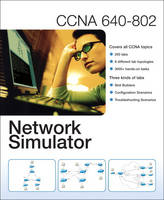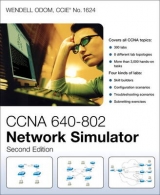
CCNA 640-802 Network Simulator
Pearson IT Certification (Hersteller)
978-1-58720-216-2 (ISBN)
- Titel erscheint in neuer Auflage
- Artikel merken
Includes 300 labs, 8 different lab topologies, and more than 3,000 hands-on tasks.
CCNA 640-802 Network Simulator, Second Edition (ISBN: 978-1-58720-444-9) helps you develop and improve hands-on configuration and troubleshooting skills without the investment in expensive lab hardware. This state-of-the-art, interactive simulation software enables you to practice your networking skills with more than 300 structured labs designed to help you learn by doing, the most effective method of learning. The labs are divided into four different types: 183 skill builder labs which help you practice short, focused configuration tasks, 47 complex configuration scenarios, which present realistic multi-layered configuration tasks, 20 challenging troubleshooting scenarios, which provide you with an opportunity to test your problem identification and resolution skills, and 50 subnetting exercises, which help you improve the speed and accuracy of your subnetting calculations.
CCNA 640-802 Network Simulator, Second Edition
ISBN: 978-1-58720-444-9
About the Previous Edition - Now Out of Print
CCNA 640-802 Network Simulator helps you develop and improve hands-on configuration and troubleshooting skills without the investment in expensive lab hardware. This state-of-the-art, interactive simulation software allows you to practice your networking skills with more than 250 structured labs designed to help you learn by doing, the most effective method of learning.
Experience realistic network device response as you work through each of the labs (available in electronic form on the CD), which include detailed instructions, topology diagrams, hints, and full answers. Unlike other simulators on the market, the lab scenarios included in the CCNA 640-802 Network Simulator are far more complex, challenging you to learn how to perform realistic network configuration and troubleshooting tasks.
This unique network simulation software helps you master the hands-on skills needed to succeed on the CCNA® exam. Topics covered include:
Router and switch navigation and administration
LAN switching
IP addressing
Routing
WANs
VLANs and trunking
IP routing protocols
Scaling IP
Troubleshooting
System Requirements:
500 MHz or higher processor
512 MB RAM (1 GB recommended)
500 MB hard drive space
32-bit true color monitor (1024x768 resolution)
Microsoft Windows XP Professional with SP3, Microsoft Vista, or Mac OS X Version 10.4.11 or higher
Java Runtime Environment (JRE) version 1.5.0
Adobe Acrobat Reader 8.0
Connection to the Internet during installation for access code validation
Although this product was published before these operating systems were released, this product has been tested and successfully installed on Windows 7 platforms as well as Mac OS X Snow Leopard (version 10.6). If you experience any trouble installing the software on these platforms, please contact Pearson Customer Technical Support at: http://www.informit.com/about/contact_us/.
Wendell Odom, CCIE® No. 1624, has been in the networking industry since 1981. He has worked as a network engineer, consultant, systems engineer, instructor, and course developer. He is author of all the previous editions of the CCNA Exam Certification Guide series from Cisco Press, as well as the Cisco QoS Exam Certification Guide, the CCIE Routing and Switching Official Exam Certification Guide, Computer Networking First Step, the CCNA Video Mentor, and other titles. He also teaches classes for Skyline Advanced Technology Services (www.skyline-ats.com) and blogs regularly at www.networkworld.com/odom.
ICND1
Skill Builders
Switch CLI Exec Mode
Switch CLI Configuration Process (2 Labs)
Router CLI Exec Mode (2 Labs)
Router CLI Configuration Process
Setting Switch Passwords
Configuring Switch IP Settings
Setting Router Passwords
Configuring Router IP Settings
Configuring Local Usernames
Using and Suspending Telnet Connections
Configuring SSH
Migrating to a New IOS® Image
Setting the Configuration Register
Comparing Configuration Files
Examining the IP Routing Table
Using debug
Testing Using Pings with Hostnames
Ignoring the Startup-config File
Booting a New Router IOS
Terminal History I
Terminal History II
Topology Analysis
Interface Settings (3 Labs)
Switch Forwarding I
Switch IP Connectivity I
VLANs (3 Labs)
Interface Status (4 Labs)
Switch Security (4 Labs)
Configuring IP Addresses (4 Labs)
Connected Routes
Static Routes (4 Labs)
Default Routes
IP Classless
Subnet Zero (2 Labs)
Loopback Interfaces
RIP Configuration (6 Labs)
RIP Verification (2 Labs)
Configuring Hostnames
PC IP Commands (3 Labs)
Serial Link Configuration (4 Labs)
Interface Status (2 Labs)
Configuration Scenarios
The Initial Configuration Dialogue (Setup)
New Job I
Rebuild a Configuration
SSH and Telnet
Switch Interfaces and Forwarding
Switch IP Connectivity
Switch Security
Configuring VLANs
Subnetting and Addressing (3 Labs)
Static Routing (2 Labs)
RIP-2 Configuration (2 Labs)
RIP Auto-summary
Serial Link Configuration I
IP and MAC Address Comparisons
IP Classless
Troubleshooting Scenarios
Switch Forwarding I
Path Analysis I
Port Security
Network Discovery (2 Labs)
IP Addressing and Routing
IP Routing I
ICND2
Skill Builders
VLAN Configuration (5 Labs)
VTP Configuration (5 Labs)
Trunking Configuration (4 Labs)
STP Analysis (2 Labs)
STP Configuration (3 Labs)
EtherChannel
IP Addressing (3 Labs)
Traceroute I
Default Route I
Zero Subnet
Switch IP Address
ACL (6 Labs)
Named ACL (3 Labs)
ACL Analysis I
Auto-summary
Routing Analysis I
Traceroute II
EIGRP Serial Configuration (6 Labs)
EIGRP Frame Relay Configuration (3 Labs)
EIGRP Authentication (2 Labs)
EIGRP Route Tuning (4 Labs)
EIGRP Neighbors (3 Labs)
OSPF Serial Configuration (6 Labs)
OSPF Router ID (2 Labs)
OSPF Frame Relay Configuration (3 Labs)
OSPF Authentication (2 Labs)
OSPF Metric Tuning (3 Labs)
OSPF Neighbors (5 Labs)
Serial Configuration (2 Labs)
Serial Authentication (2 Labs)
Frame Relay Configuration (5 Labs)
Frame Relay Verification (3 Labs)
NAT Configuration (7 Labs)
IPv6 Address Configuration (9 Labs)
IPv6 Routing Configuration (3 Labs)
IPv6 Hostnames
Configuration Scenarios
VTP I
VTP Transparent Mode
VLAN Trunking (2 Labs)
STP Analysis I
STP Configuration II
IP Addressing and Configuration (2 Labs)
IP Default Routing and IP Classless
Default Routes
Standard ACL I
Extended ACL (2 Labs)
OSPF Configuration (3 Labs)
OSPF Metric Manipulation
EIGRP Serial Configuration I
EIGRP Configuration II
EIGRP Metric Manipulation I
EIGRP Variance and Maximum Paths I
Frame Relay Configuration I
Frame Relay Inverse ARP
Frame Relay Correlation
NAT Configuration (2 Labs)
IPv6 Configuration (2 Labs)
Troubleshooting Scenarios
Path Analysis (3 Labs)
Path Troubleshooting (4 Labs)
VLAN Troubleshooting I
OSPF Troubleshooting I
Routing Analysis III
Network Expansion
NAT
IP Routing II
9781587202162/1587202166 TOC 6/2/2009
| Erscheint lt. Verlag | 2.7.2009 |
|---|---|
| Zusatzinfo | sd., col. |
| Verlagsort | Upper Saddle River |
| Sprache | englisch |
| Maße | 191 x 232 mm |
| Gewicht | 196 g |
| Themenwelt | Mathematik / Informatik ► Informatik ► Netzwerke |
| ISBN-10 | 1-58720-216-6 / 1587202166 |
| ISBN-13 | 978-1-58720-216-2 / 9781587202162 |
| Zustand | Neuware |
| Haben Sie eine Frage zum Produkt? |
